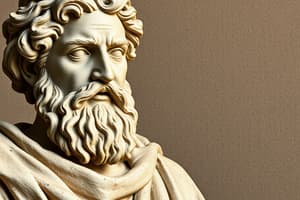Podcast
Questions and Answers
What did Aristotle mean by 'natural slavery'?
What did Aristotle mean by 'natural slavery'?
Aristotle believed that some individuals are naturally suited for servitude due to their lack of capacity for reason.
How did Aristotle differentiate between natural and conventional slavery?
How did Aristotle differentiate between natural and conventional slavery?
Aristotle acknowledged conventional slavery as resulting from war or conquest, which he considered less just than natural slavery.
What is a major criticism of Aristotle's defense of slavery?
What is a major criticism of Aristotle's defense of slavery?
Critics argue that Aristotle's justification of slavery conflicts with his emphasis on human flourishing and the importance of reason.
According to Aristotle, what is the primary purpose of the state or 'polis'?
According to Aristotle, what is the primary purpose of the state or 'polis'?
In what ways did Aristotle's political philosophy influence later thought?
In what ways did Aristotle's political philosophy influence later thought?
How does Aristotle classify forms of government?
How does Aristotle classify forms of government?
What moral debate surrounds Aristotle's views on citizenship?
What moral debate surrounds Aristotle's views on citizenship?
What form of government does Aristotle consider the most stable and just?
What form of government does Aristotle consider the most stable and just?
What is Aristotle's view on citizenship?
What is Aristotle's view on citizenship?
How does Aristotle's portrayal of humans relate to his view on the state?
How does Aristotle's portrayal of humans relate to his view on the state?
What are the three good forms of government according to Aristotle?
What are the three good forms of government according to Aristotle?
What controversial stance did Aristotle take regarding slavery?
What controversial stance did Aristotle take regarding slavery?
What does Aristotle believe is necessary for a state to facilitate the good life?
What does Aristotle believe is necessary for a state to facilitate the good life?
Flashcards are hidden until you start studying
Study Notes
Aristotle's Views on the State
- Aristotle believed the state, or "polis", was a natural and essential institution.
- He argued humans are "political animals", naturally seeking community.
- The State, as the highest form of community arises from families and villages.
- It's purpose is to ensure the "highest good", which is living a virtuous and happy life.
Classification of Government
- Aristotle classified governments based on the number of rulers and whether they govern for the common good or their own interests.
- He categorized into three "good" forms and three "deviant" forms.
Good Forms
- Monarchy: Rule by one, for the common good.
- Aristocracy: Rule by a few, for the common good.
- Polity: Rule by many, for the common good.
Deviant Forms
-
Tyranny: Rule by one, for self-interest
-
Oligarchy: Rule by a few, for self-interest.
-
Democracy: Rule by many, for self-interest.
-
Aristotle favored polity as the most stable and just form, balancing the needs of the rich and poor.
Aristotle's Concept of Citizenship
- He believed citizens should participate in the political life of the state.
- Citizens should have the right to participate in public decision-making processes.
- However, his definition of citizenship was limited to a specific class of people.
Aristotle's Views on Slavery
- He defended slavery as a natural and necessary part of society.
- He argued some individuals are "natural slaves", lacking the capacity for reason.
- These individuals were better suited to following the direction of others.
Natural Slavery
- Certain individuals are born with physical and mental attributes that make them naturally suited for servitude.
Conventional Slavery
- He recognized that many slaves were taken through war or conquest.
- He acknowledged this as a less just form of slavery.
Criticism of Slavery
- He justified slavery on theoretical grounds.
- His views have been criticized for being inconsistent with his emphasis on human flourishing and the role of reason.
- His defense of slavery is considered a major ethical flaw in his political theory.
Summary of Aristotle's Political Philosophy
- His views on the state, government, and citizenship have significantly influenced political thought throughout history.
- He's often credited with laying the groundwork for republican and constitutional ideas in the Western tradition.
- His ideas on slavery and his exclusionary concept of citizenship have been subject to moral debate for centuries.
Studying That Suits You
Use AI to generate personalized quizzes and flashcards to suit your learning preferences.




